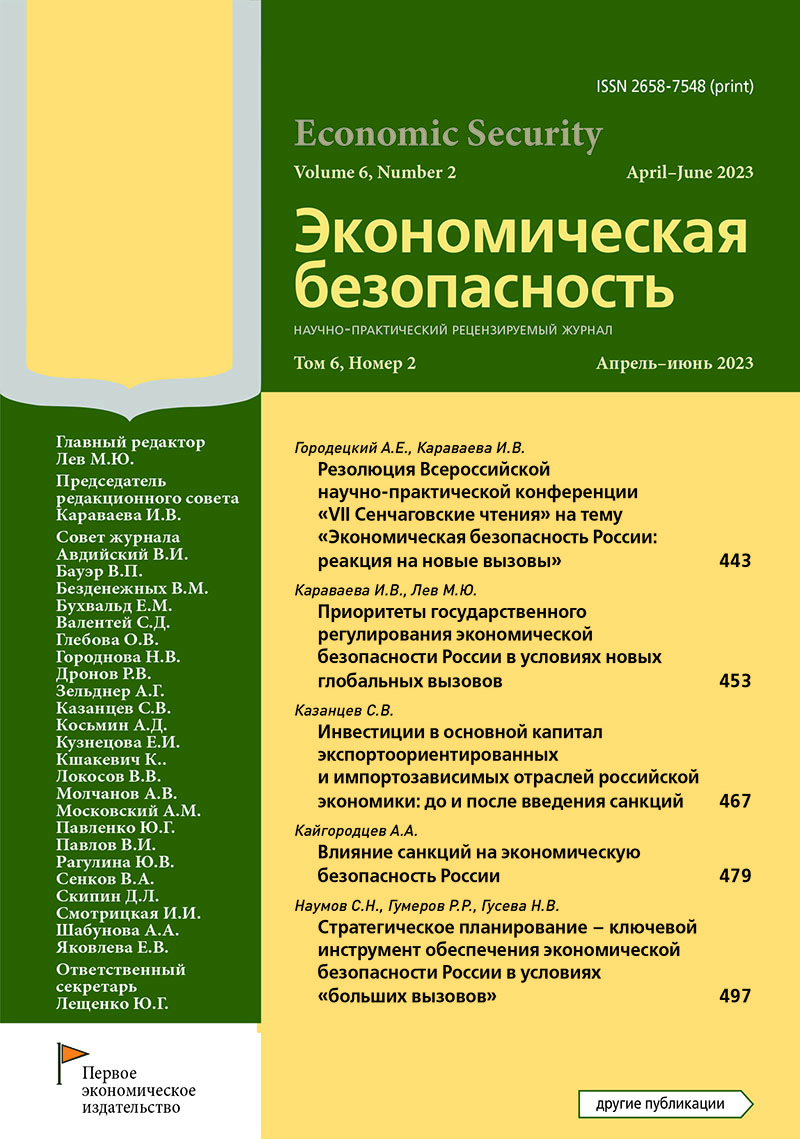Vol 6, No 2 (2023)
Articles
Resolution of the All-Russian Scientific and Practical Conference “The 7th Senchagov Readings” on the topic “Russia's economic security: responding to new challenge”
Abstract
 443-452
443-452


Priorities of state regulation of Russia's economic security amidst new global challenges
Abstract
 453-466
453-466


Investments in fixed assets of export-oriented and import-dependent sectors of the Russian economy: before and after the introduction of sanctions
Abstract
 467-478
467-478


Impact of sanctions on Russia's economic security
Abstract
 479-496
479-496


Strategic planning as a key tool for ensuring Russia's economic security in the face of grand challenges
Abstract
 497-508
497-508


Challenges for socio-economic security in the sphere of labor and their features in modern Russia
Abstract
 509-528
509-528


Consequences of Russia's suspension in the FATF
Abstract
 529-540
529-540


The place of the gas industry in the energy security system of Russia on foreign markets
Abstract
In this paper, special attention paid to the leading position of the gas industry in the system of economic and energy security of Russia. The system-forming role of the gas industry for the Russian economy considered the main problems of the gas sector and its development trends identified in order to increase the competitiveness of the domestic fuel and energy complex and develop the gas market. Based on the results of the study, conclusions drawn about the instability of export prices for natural gas and the tendency to increase the volatility of natural gas exports over previous years, with a relatively stable domestic consumption of "blue fuel" at the level of 2% of Russia's GDP. The volume of natural gas exports to the FSU countries in 2015-2021 tended to decrease with the growth of demand in non-CIS countries, at the same time, the average gas sales price for the FSU countries turned out to be less volatile with the non-stationarity of average gas sales prices from Russia to other countries. Thus, the gas industry for Russia not only of strategic importance, the creation of a single gas market between the Russian Federation and the FSU countries a priority at the present stage in order to increase the protection of the Russian economy from internal and external threats, which will also ensure a stable demand for gas in the participating countries regional natural gas market, followed by an increase in natural gas consumption and a reorientation of Russian gas exports towards more stable and reliable supplies.
 541-554
541-554


State loans to the population as a source of financing for the defense industry: Soviet experience and its applicability in modern conditions
Abstract
 555-568
555-568


Conditions for improving food security as a factor of ensuring the economic security of the region
Abstract
 569-594
569-594


Social policy priorities in the labor sphere
Abstract
 595-610
595-610


Increasing the efficiency of national priority projects based on monitoring as a tool for ensuring the economic security of the state
Abstract
 611-626
611-626


Russia's economic security and economic system integrity: theoretical and methodological aspects
Abstract
 627-646
627-646


Analysis of the use of «controlled chaos» technologies as an information weapon carried out by «democratic» countries in order to prevent the independent development of states
Abstract
 647-674
647-674


Changing Russia's technological development strategy in response to Western self-isolation
Abstract
 675-688
675-688


Tax impact on consumption inequality in the context of ensuring Russia's economic security
Abstract
 689-702
689-702


Development of human potential as a factor of ensuring the regional economic security
Abstract
 703-716
703-716


Sustainable development of Russian regions: from strategy to tactics
Abstract
 717-728
717-728


The experience economy and tourism: post-covid reboot in the context of the country's socio-economic security
Abstract
 729-748
729-748


The driving forces behind the anti-Russian coalition: challenges to contemporary international security
Abstract
 749-774
749-774


Sanctions policy against Russia at the level of international organisations
Abstract
 775-792
775-792


Company's financial sustainability in foreign economic activity amidst anti-Russian sanctions as a basis for economic security
Abstract
 793-806
793-806


Factors facilitating and hindering the development of ESG investments in Russia
Abstract
Today's discussion about sustainable development has its roots in the 1970-s and evolving along with growing social and environmental crises. For a long time, to integrate non-financial issues into asset management processes, the financial market has experimented with various approaches, using names such as «ethical», «socially responsible» or «sustainable investment». Climate change, as one of the three global problems of mankind creates significant financial problems for the world community. Investors are currently trying to take environmental, social and governance (ESG) into account when making investment decisions. At the same time, market participants are still little aware of the nuances of the ESG integration process, which is sometimes associated with the approach to the withdrawal of individual industries, firms and projects from the portfolio. Investors believe that corporate governance issues are critical as they directly affect profitability and, ultimately, a firm's dividend policy. However, few people are aware of the impact of environmental and social factors on the company's financial performance.
 807-826
807-826











